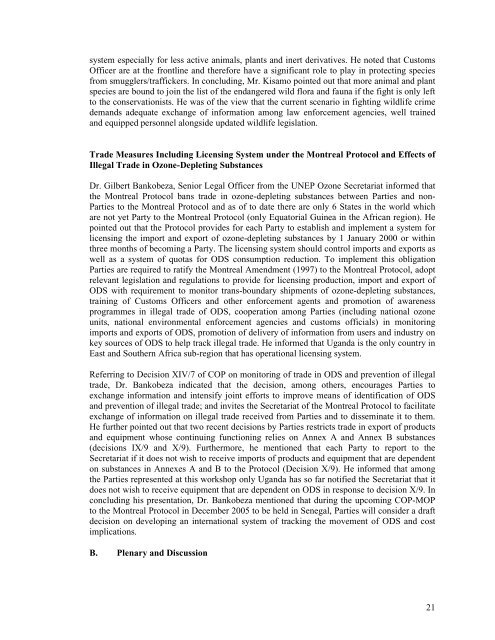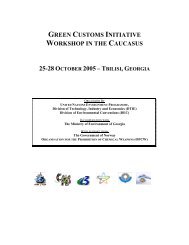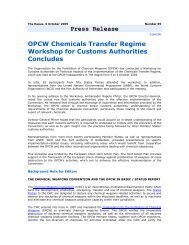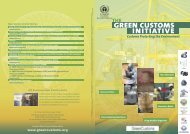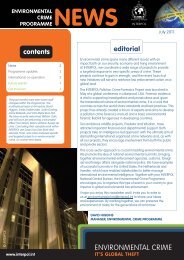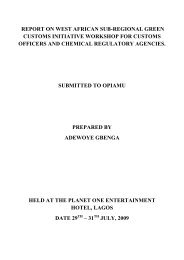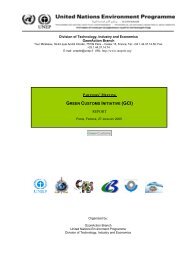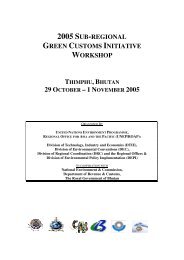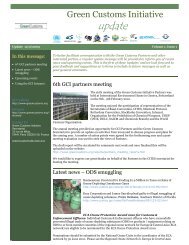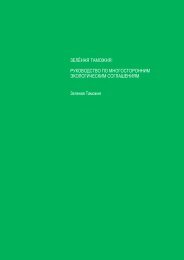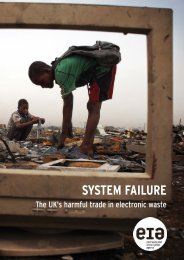Arusha - Green Customs Initiative
Arusha - Green Customs Initiative
Arusha - Green Customs Initiative
Create successful ePaper yourself
Turn your PDF publications into a flip-book with our unique Google optimized e-Paper software.
system especially for less active animals, plants and inert derivatives. He noted that <strong>Customs</strong><br />
Officer are at the frontline and therefore have a significant role to play in protecting species<br />
from smugglers/traffickers. In concluding, Mr. Kisamo pointed out that more animal and plant<br />
species are bound to join the list of the endangered wild flora and fauna if the fight is only left<br />
to the conservationists. He was of the view that the current scenario in fighting wildlife crime<br />
demands adequate exchange of information among law enforcement agencies, well trained<br />
and equipped personnel alongside updated wildlife legislation.<br />
Trade Measures Including Licensing System under the Montreal Protocol and Effects of<br />
Illegal Trade in Ozone-Depleting Substances<br />
Dr. Gilbert Bankobeza, Senior Legal Officer from the UNEP Ozone Secretariat informed that<br />
the Montreal Protocol bans trade in ozone-depleting substances between Parties and non-<br />
Parties to the Montreal Protocol and as of to date there are only 6 States in the world which<br />
are not yet Party to the Montreal Protocol (only Equatorial Guinea in the African region). He<br />
pointed out that the Protocol provides for each Party to establish and implement a system for<br />
licensing the import and export of ozone-depleting substances by 1 January 2000 or within<br />
three months of becoming a Party. The licensing system should control imports and exports as<br />
well as a system of quotas for ODS consumption reduction. To implement this obligation<br />
Parties are required to ratify the Montreal Amendment (1997) to the Montreal Protocol, adopt<br />
relevant legislation and regulations to provide for licensing production, import and export of<br />
ODS with requirement to monitor trans-boundary shipments of ozone-depleting substances,<br />
training of <strong>Customs</strong> Officers and other enforcement agents and promotion of awareness<br />
programmes in illegal trade of ODS, cooperation among Parties (including national ozone<br />
units, national environmental enforcement agencies and customs officials) in monitoring<br />
imports and exports of ODS, promotion of delivery of information from users and industry on<br />
key sources of ODS to help track illegal trade. He informed that Uganda is the only country in<br />
East and Southern Africa sub-region that has operational licensing system.<br />
Referring to Decision XIV/7 of COP on monitoring of trade in ODS and prevention of illegal<br />
trade, Dr. Bankobeza indicated that the decision, among others, encourages Parties to<br />
exchange information and intensify joint efforts to improve means of identification of ODS<br />
and prevention of illegal trade; and invites the Secretariat of the Montreal Protocol to facilitate<br />
exchange of information on illegal trade received from Parties and to disseminate it to them.<br />
He further pointed out that two recent decisions by Parties restricts trade in export of products<br />
and equipment whose continuing functioning relies on Annex A and Annex B substances<br />
(decisions IX/9 and X/9). Furthermore, he mentioned that each Party to report to the<br />
Secretariat if it does not wish to receive imports of products and equipment that are dependent<br />
on substances in Annexes A and B to the Protocol (Decision X/9). He informed that among<br />
the Parties represented at this workshop only Uganda has so far notified the Secretariat that it<br />
does not wish to receive equipment that are dependent on ODS in response to decision X/9. In<br />
concluding his presentation, Dr. Bankobeza mentioned that during the upcoming COP-MOP<br />
to the Montreal Protocol in December 2005 to be held in Senegal, Parties will consider a draft<br />
decision on developing an international system of tracking the movement of ODS and cost<br />
implications.<br />
B. Plenary and Discussion<br />
21


